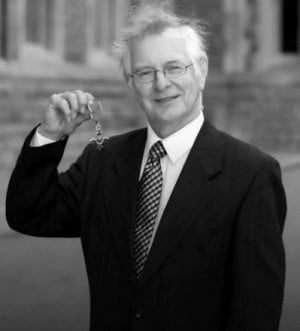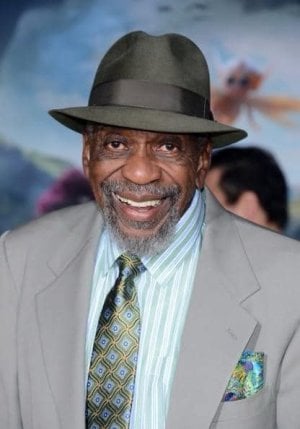Farewell to legends: Cricket pioneer and beloved Hollywood actor pass away
- Replies 5
In recent days, both the sports and entertainment worlds have bid farewell to two remarkable individuals who left an indelible mark on their respective fields.
The passing of these icons has prompted an outpouring of tributes and reflections on their profound contributions and enduring legacies.
Their innovative approaches and steadfast dedication have forever changed the landscapes they graced, inspiring countless individuals and setting new standards of excellence.
The cricket community is in mourning following the passing of a true legend of the game, Frank Duckworth, at the age of 84.
Duckworth, whose name is synonymous with the revolutionary Duckworth-Lewis method, left an indelible mark on the sport, transforming how interrupted matches are decided and ensuring a fairer outcome in the face of inclement weather.
Frank Duckworth, along with his colleague Tony Lewis, crafted a mathematical solution that has become a cornerstone of limited-overs cricket.
Their innovative approach to recalculating target scores in rain-affected matches was officially adopted by the International Cricket Council (ICC) in 1999.

According to a statement by the London-based Royal Statistical Society, ‘Frank will be remembered largely for his contributions to the Society as editor of RSS NEWS, and to cricket as the co-inventor of the Duckworth-Lewis method.’
It was at an RSS conference in 1992 that Duckworth first presented his paper titled A Fair Result in Foul Weather, which was directly inspired by the controversial ending to the 1992 World Cup semi-final between England and South Africa.
This match became infamous for its flawed rain rule that left South Africa with an impossible target of 22 runs off one ball.
The Duckworth-Lewis method, as it came to be known, was first put into practice during England's one-day series against Zimbabwe in 1999.
Since then, it has been refined and updated, with Australian statistician Steven Stern later contributing to its evolution.
Following the retirement of its original creators, the method was renamed the Duckworth-Lewis-Stern method.
On the morning of June 26, tributes poured in from across the cricketing world, with commentators and fans expressing their sadness and respect for Duckworth's contributions.
Renowned cricket commentator Rob Eastaway took to social media to share the news of Duckworth's passing, saying, ‘I’m sad to report that Frank Duckworth MBE, co-creator of the Duckworth-Lewis method for adjusting targets in rain-affected cricket matches, passed away last Friday.’
‘His method was used just yesterday in the rain-affected World Cup match between Afghanistan and Bangladesh. RIP.’
Meanwhile, the entertainment world has bid farewell to one of its most enduring and respected talents, as Bill Cobbs, the esteemed American actor known for his versatility and warmth, passed away on Tuesday, June 25, at 90.
His departure leaves behind a legacy that spans over five decades, with a filmography that includes more than 150 roles across both the silver screen and television.
Bill Cobbs' journey through life and art is a testament to the power of perseverance and the pursuit of passion.

Born on June 16, 1934, in Cleveland, Ohio, Cobbs' early years were a far cry from the glitz and glamour of Hollywood.
Before he graced the stage and screen, he served with distinction in the United States Air Force for eight years, a period that no doubt instilled in him the discipline and resilience that would later characterise his acting career.
It wasn't until age 36 that Cobbs took the bold step to follow his dreams into acting—a decision that would lead to an illustrious career.
His talent quickly became apparent, and he soon found himself sharing scenes with some of the industry's biggest names.
In the 1992 hit film The Bodyguard, Cobbs stood alongside Whitney Houston and Kevin Costner, delivering a performance that was both grounded and memorable.
His role in Night at the Museum saw him enchanting audiences with his portrayal of Reginald, a security guard, alongside Ben Stiller.
Cobbs' ability to captivate extended beyond feature films. He made his mark on television with guest appearances on shows like Walker, Texas Ranger and a memorable part in the critically acclaimed HBO series The Sopranos.
His dedication to his craft was recognised in 2020 when he won a Daytime Emmy Award for his appearance in the Canadian children’s show Dino Dana, proving that his talent knew no bounds and resonated with audiences of all ages.
His brother, Thomas Cobbs, paid tribute to him on social media, saying, 'A beloved partner, big brother, uncle, surrogate parent, godfather and friend, Bill recently and happily celebrated his 90th birthday surrounded by cherished loved ones.'
Thomas also mentioned that his brother passed away ‘peacefully’ at his residence in California.

Our thoughts and prayers are with Duckworth's and Cobbs' family, friends, and relatives in this difficult time. May they rest in peace.
Have you watched a cricket game in which the Duckworth-Lewis method was applied? Which is your favourite Bill Cobbs role on TV or in movies? Let us know in the comments below!
The passing of these icons has prompted an outpouring of tributes and reflections on their profound contributions and enduring legacies.
Their innovative approaches and steadfast dedication have forever changed the landscapes they graced, inspiring countless individuals and setting new standards of excellence.
The cricket community is in mourning following the passing of a true legend of the game, Frank Duckworth, at the age of 84.
Duckworth, whose name is synonymous with the revolutionary Duckworth-Lewis method, left an indelible mark on the sport, transforming how interrupted matches are decided and ensuring a fairer outcome in the face of inclement weather.
Frank Duckworth, along with his colleague Tony Lewis, crafted a mathematical solution that has become a cornerstone of limited-overs cricket.
Their innovative approach to recalculating target scores in rain-affected matches was officially adopted by the International Cricket Council (ICC) in 1999.

Cricket pioneer and Duckworth-Lewis co-inventor, Frank Duckworth, has died at 84. Credit: Instagram / CricketGully
According to a statement by the London-based Royal Statistical Society, ‘Frank will be remembered largely for his contributions to the Society as editor of RSS NEWS, and to cricket as the co-inventor of the Duckworth-Lewis method.’
It was at an RSS conference in 1992 that Duckworth first presented his paper titled A Fair Result in Foul Weather, which was directly inspired by the controversial ending to the 1992 World Cup semi-final between England and South Africa.
This match became infamous for its flawed rain rule that left South Africa with an impossible target of 22 runs off one ball.
The Duckworth-Lewis method, as it came to be known, was first put into practice during England's one-day series against Zimbabwe in 1999.
Since then, it has been refined and updated, with Australian statistician Steven Stern later contributing to its evolution.
Following the retirement of its original creators, the method was renamed the Duckworth-Lewis-Stern method.
On the morning of June 26, tributes poured in from across the cricketing world, with commentators and fans expressing their sadness and respect for Duckworth's contributions.
Renowned cricket commentator Rob Eastaway took to social media to share the news of Duckworth's passing, saying, ‘I’m sad to report that Frank Duckworth MBE, co-creator of the Duckworth-Lewis method for adjusting targets in rain-affected cricket matches, passed away last Friday.’
‘His method was used just yesterday in the rain-affected World Cup match between Afghanistan and Bangladesh. RIP.’
Meanwhile, the entertainment world has bid farewell to one of its most enduring and respected talents, as Bill Cobbs, the esteemed American actor known for his versatility and warmth, passed away on Tuesday, June 25, at 90.
His departure leaves behind a legacy that spans over five decades, with a filmography that includes more than 150 roles across both the silver screen and television.
Bill Cobbs' journey through life and art is a testament to the power of perseverance and the pursuit of passion.

Renowned actor Hollywood actor Bill Cobbs has died at the age of 90. Credit: Facebook / Thomas G. Cobbs
Born on June 16, 1934, in Cleveland, Ohio, Cobbs' early years were a far cry from the glitz and glamour of Hollywood.
Before he graced the stage and screen, he served with distinction in the United States Air Force for eight years, a period that no doubt instilled in him the discipline and resilience that would later characterise his acting career.
It wasn't until age 36 that Cobbs took the bold step to follow his dreams into acting—a decision that would lead to an illustrious career.
His talent quickly became apparent, and he soon found himself sharing scenes with some of the industry's biggest names.
In the 1992 hit film The Bodyguard, Cobbs stood alongside Whitney Houston and Kevin Costner, delivering a performance that was both grounded and memorable.
His role in Night at the Museum saw him enchanting audiences with his portrayal of Reginald, a security guard, alongside Ben Stiller.
Cobbs' ability to captivate extended beyond feature films. He made his mark on television with guest appearances on shows like Walker, Texas Ranger and a memorable part in the critically acclaimed HBO series The Sopranos.
His dedication to his craft was recognised in 2020 when he won a Daytime Emmy Award for his appearance in the Canadian children’s show Dino Dana, proving that his talent knew no bounds and resonated with audiences of all ages.
His brother, Thomas Cobbs, paid tribute to him on social media, saying, 'A beloved partner, big brother, uncle, surrogate parent, godfather and friend, Bill recently and happily celebrated his 90th birthday surrounded by cherished loved ones.'
Thomas also mentioned that his brother passed away ‘peacefully’ at his residence in California.
Key Takeaways
- Frank Duckworth, an esteemed figure in the cricket world and co-inventor of the Duckworth-Lewis method, passed away at age 84.
- The Duckworth-Lewis method, a revolutionary mathematical solution for determining fair outcomes in rain-affected cricket matches, was officially adopted in 1999.
- Renowned Hollywood actor Bill Cobbs passed away at age 90, leaving behind a legacy of more than 150 roles in film and television.
- Bill Cobbs' impactful acting career included memorable roles in The Bodyguard and Night at the Museum, and he was awarded a Daytime Emmy in 2020 for his work in the children's show Dino Dana.
Our thoughts and prayers are with Duckworth's and Cobbs' family, friends, and relatives in this difficult time. May they rest in peace.
Have you watched a cricket game in which the Duckworth-Lewis method was applied? Which is your favourite Bill Cobbs role on TV or in movies? Let us know in the comments below!







